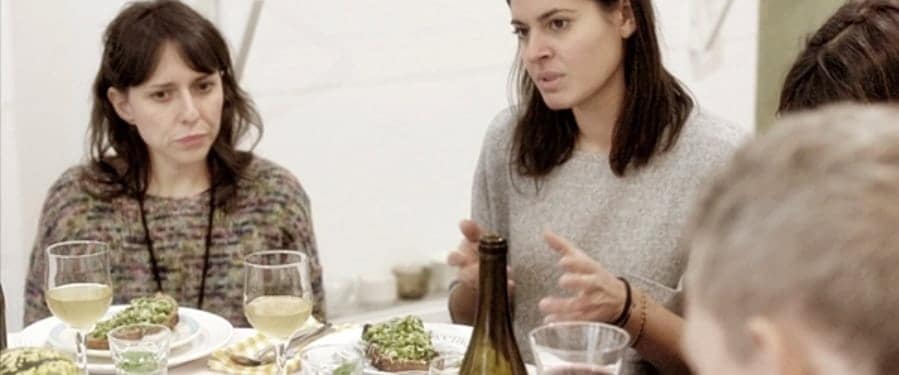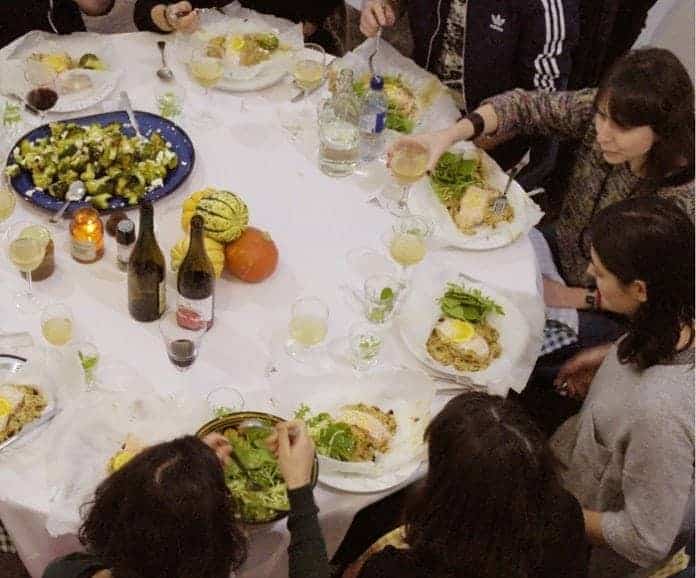

Recently I was invited to MMX gallery in Deptford by photographer Tanya Houghton as part of the ‘UrbanPhotoFest’. She picked nine diners to share a meal with her in the gallery, surrounded by ‘A Migrant’s Tale’, her photo-series exploring nostalgia and home through the language of food. We were all born outside of the UK but now call it home, which is why we were chosen.


With her striking dark eyes and and engaging presence, Tanya herself is of British, Dutch and Indian heritage. As the starters appear, she effortlessly encourages us to tell our stories of home and food. Veronica Dick, a nutritionist who researches how food assists healing in severely ill people, has prepared us a beautiful meal of salmon packets and pea bruschetta starters. Amongst the guests, there’s a Jordanian recently moved to London, a Spanish-Irish Australian and a professor of sociology from Goldsmiths (who researches how smell affects our sense of geographical place). I’m Zimbabwean, of South African, Dutch-Jewish and Welsh heritage.
From ‘A Migrant’s Tale’ photo by Tanya HoughtonWhilst we’re all quite different, what’s immediately obvious is that sharing a meal is a good way to open up; there’s an easy generosity in a shared nourishment ritual. Each person has their own narrative, but equally we all seem to share a few universal needs attached to food: love, community, family, well-being and belonging.
“When I first got to London, people would invite me round just so that I could make them my mum’s chocolate mousse,” says Fernando Berry from Otros Vinos who has supplied our organic wine. It seems in childhood, food and recipes bond us directly to our parents and therefore become fiercely held traditions. Recipes are imbued with a sense of family magic, mythology and memory. “Everyone always asks me for the recipe, but it took me years to wrestle from mum and it’s like my friendship super-power; something they love me for…so it’s hard to let go.”
The conversation pointed out blind spots in my own approach to food and unearthed a sadness and longing for ‘home’ that I suppress all the time. Our dominant social food ritual at home is the barbeque (or ‘Braai) but in truth, I rarely invite friends over for a braai as a way of ‘sharing my culture’ in the UK. Due to the ignominy of apartheid and recent post-colonial history, sometimes it feels easier to adapt and blend-in rather than parade the rituals of a perceived ‘aberrant culture.’ It’s much more complicated than this of course, but being able to symbolically break bread with others who listened with open minds was a powerful antidote.
It was agreed that in a geographical sense one of the most immediate benefits of immigration is how it creates fertile culinary enrichment. London is riven with little seams of international cuisine and varied produce, which serve as open interfaces between differing cultures. It’s simple; if food is interesting and tasty enough, it becomes an inclusive language of joy.
As Alex Rhys-Tailor from Goldsmiths pointed out, food and smell are intuitive and immediate. For me, this dinner was a wholly visceral experience. It was wonderful to listen, understand and find common ground with other ‘immigrants’ through food and conversation. I resolved to be more proud and share my own food heritages but also to seek out others and share theirs.
It did also make me wonder how South Africans and Zimbabweans might use food as a path to a more happily integrated future back ‘home’?
Thanks to:
https://www.tanyahoughton.com/
Gordon Glyn-Jones is an artist and writer who lives and works in London. Contact him via www.gordonglyn-jones.com
This article also featured here
Image Credits: Tanya Houghton